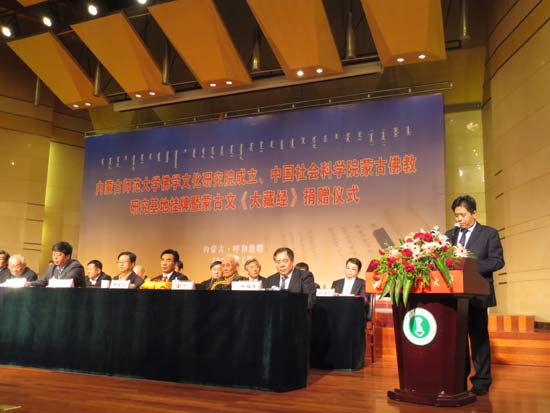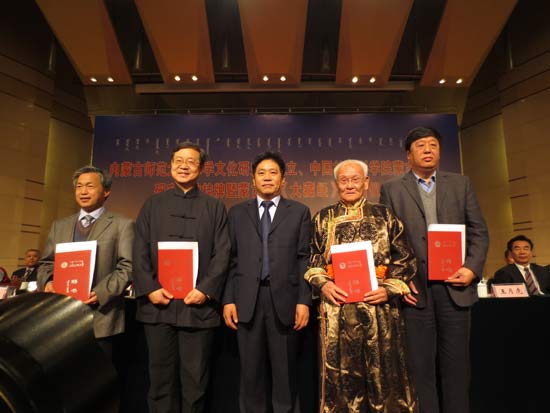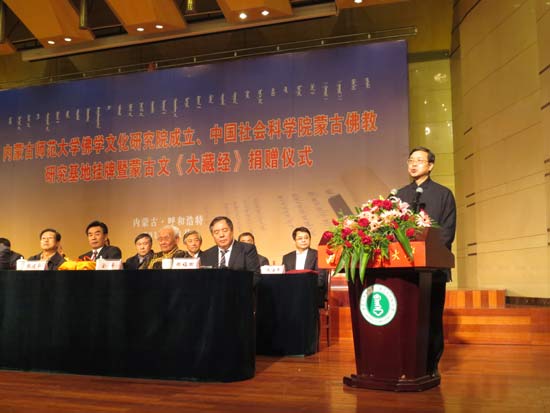Buddhist culture institute opens in Inner Mongolia
By Liu Yufen (chinadaily.com.cn)
Updated: 2014-11-13
The Buddhist Culture Institute of Inner Mongolia Normal University was inaugurated on Nov 11 thanks to cooperation and joint efforts of the Institute of World Religions of the Chinese Academy of Social Science (CASS) and Inner Mongolia Normal University. It is the first such research organization specializing in Buddhism in the Inner Mongolia autonomous region.
 |
|
The unveiling ceremony of the Buddhist Culture Institute of Inner Mongolia Normal University, as well as a Mongolian Buddhism Research Base of CASS, is held on Nov 11 in Inner Mongolia Normal University, Hohhot. [Photo provided to chinadaily.com.cn] |
The establishment of a Buddhist culture institute is an exploratory and pioneering cooperation. Philosophy and social science are closely related with social development. Religious culture has a long history and wide-reaching influence in Inner Mongolia, especially Buddhist culture. Therefore, it is significant to study religion in conjunction with real social development, according to Zhuo Yueping, head of the CASS’s World Religions Institute.
Buddhism is a critical influence on the Mongolian ethnic group, Mongolian culture and arts, said by Jin Feng, an expert on Buddhist documents and Buddhist history. Featuring local and ethnic characteristics, the Buddhist Culture Institute of Inner Mongolia Normal University will seek to be an international culture research center that impacts Russia, Mongolia, Bulgaria and other regions in East Asia, through?the works of multi-profession experts and the support of CASS’s World Religions Institute.
 |
|
Yun Guohong, president of Inner Mongolia Normal University, grants letters of appointment to experts at the unveiling ceremony of the Buddhist Culture Institute of Inner Mongolia Normal University,?on Nov 11.[Photo provided to chinadaily.com.cn] |
Inner Mongolia Normal University is home to nearly 30 experts in various Buddhism related fields, such as Buddhist studies, Mongolian documents, Buddhist documents and ethnology. They have been devoted to the study of Buddhist culture. The Dazangjing (Chinese Buddhist canon) in Mongolian was officially published this April after 15 years of rescue work. Professor Jin Feng served as the chief editor. It is the most complete Buddhist canon at home and abroad to date, including 400 volumes of Mongolian scriptures and covering fields of history, language, culture, astronomy, calendar and Mongolian medicine.
 |
|
Zhuo Yueping, head of the CASS’s World Religions Institute, makes a speech at the unveiling ceremony of the Buddhist Culture Institute of Inner Mongolia Normal University on Nov 11 in Inner Mongolia Normal University. [Photo provided to chinadaily.com.cn] |
The establishment of this Buddhist Culture Institute is recognized as an echo to the needs of various aspects. China is a country of multi-ethnic and religious beliefs and Inner Mongolia is a region home to different ethnic groups with a large amount of religions. There is no professional religious research institute to date.
For Inner Mongolia Normal University, it’s a measure for its cultivation of religious professionals, religious studies and system innovation.
“Through this cooperation, we hope to explore a practical coordinated innovation model and apply it in other social science studies,” said Yu Guohong, president of Inner Mongolia Normal University.
Edited by Michael Thai

High-speed train debuts in Inner Mongolia
A bullet train departed Hohhot East Railway Station for Ulanqab marking the start of high-speed rail services using Inner Mongolia’s first newly-laid high-speed railway on Aug 3.
